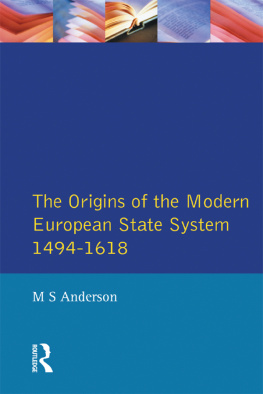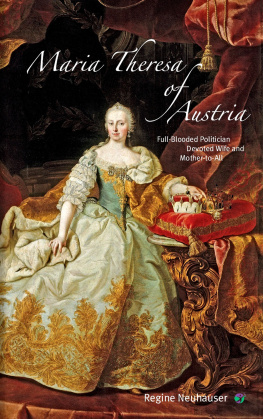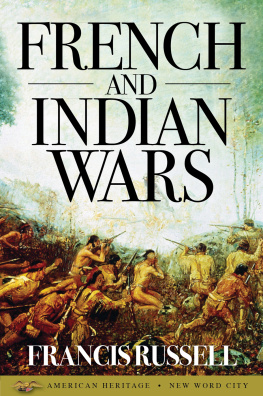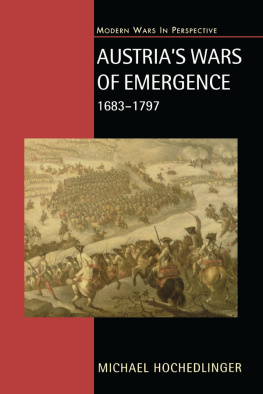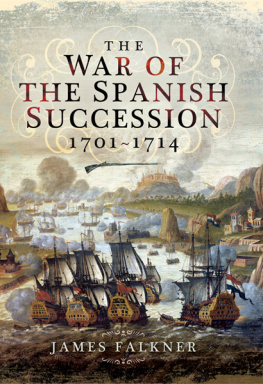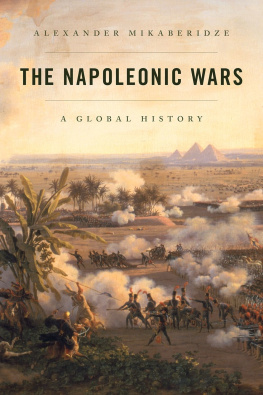THE WAR OF THE AUSTRIAN SUCCESSION
MODERN WARS IN PERSPECTIVE
General Editors: H.M. Scott and B.W. Collins
ALREADY PUBLISHED
Mexico and the Spanish Conquest
Ross Hassig
The Wars of French Decolonization
Anthony Clayton
The Spanish-American War: Conflict in the Caribbean and the Pacific 18951902
Joseph Smith
The War of the Austrian Succession, 17401748
M.S. Anderson
THE WAR OF THE AUSTRIAN
SUCCESSION,
17401748
M. S. ANDERSON

First published 1995 by Pearson Education Limited
Second impression 1999
Published 2013 by Routledge
2 Park Square, Milton Park, Abingdon, Oxon OX14 4RN
711 Third Avenue, New York, NY 10017, USA
Routledge is an imprint of the Taylor & Francis Group, an informa business
Copyright 1995, Taylor & Francis.
All rights reserved. No part of this book may be reprinted or reproduced or utilised in any form or by any electronic, mechanical, or other means, now known or hereafter invented, including photocopying and recording, or in any information storage or retrieval system, without permission in writing from the publishers.
Notices
Knowledge and best practice in this field are constantly changing. As new research and experience broaden our understanding, changes in research methods, professional practices, or medical treatment may become necessary.
Practitioners and researchers must always rely on their own experience and knowledge in evaluating and using any information, methods, compounds, or experiments described herein. In using such information or methods they should be mindful of their own safety and the safety of others, including parties for whom they have a professional responsibility.
To the fullest extent of the law, neither the Publisher nor the authors, contributors, or editors, assume any liability for any injury and/or damage to persons or property as a matter of products liability, negligence or otherwise, or from any use or operation of any methods, products, instructions, or ideas contained in the material herein.
ISBN 13: 978-0-582-05950-4 (pbk)
British Library Cataloguing-in-Publication Data
A catalogue record for this book is
available from the British Library
Library of Congress Cataloging-in-Publication Data
Anderson, M.S. (Matthew Smith)
The War of the Austrain Succession, 1740-1748 / M.S. Anderson.
p. cm - (Modern wars in perspective)
Includes bibliographical references and index.
ISBN 0-582-05951-8 (CSD). -ISBN 0-582-05950-X (PPR)
1. Austrain Succession, War of, 1740-1748. I. Title. II. Series.
D292.A32 1995
940.2'532-dc20 | 94-15591
CIP |
Set by 7 in 10/12 Sabon
CONTENTS
This book, which covers relatively briefly a large and complex subject and is intended in the main for students, is the product of reading and teaching which has extended over many years, sometimes intermittently, and to which many friends have contributed, sometimes unconsciously. I should like, however, to pay tribute to the memory of my former teachers, David Horn and Richard Pares, who did most of all to awaken my interest in history in general and that of the eighteenth century in particular, and also record my debt to the editor of this series, Hamish Scott, to whose perceptive and illuminating comments I owe much. As always, I am also deeply indebted to the British Library, the British Library of Political and Economic Science and the London Library. Without their bountiful resources and helpful staffs my task would have been much more difficult.
| Arneth, Geschichte | A. von Arneth, Geschichte Maria Theresias (10 vols, Vienna, 186379) |
| Barbier, Chronique | Chronique de la Rgence et du Rgne de Louis XV (17181763), ou Journal de Barbier (4 vols, Paris, 1885) |
| Baudi di Vesme, La Pace | C. Baudi di Vesme, La Pace di Aquis grana (1748) (Turin, 1969) |
| Baudrillart, Philippe V | A. Baudrillart, Philippe V et la Cour de France (5 vols, Paris, 18901902) |
| Berney, Friedrich | A. Berney, Friedrich der Grosse: Entwicklungsgeschichte eines Staatsmannes (Tbingen, 1934) |
| Butler, Choiseul | R. Butler, Choiseul, i, Father and Son, 17191754 (Oxford, 1980) |
| Carutti, Storia | D. Carutti, Storia della Diplomazia della Corte di Savoia (4 vols, Turin, 187580) |
| Guglia, Maria Theresia | E. Guglia, Maria Theresia: Ihre Leben und ihre Regierung (2 vols, Munich-Berlin, 1917) |
| Lodge, Studies | Sir R. Lodge, Studies in Eighteenth-Century Diplomacy, 17408 (London, 1930) |
| Mediger, Moskaus Weg | W. Mediger, Moskaus weg nach Europa: Der Aufstieg Russlands zum europischen Machtstaat im Zeitalter Friedrichs des Grossen (Braunschweig, 1952) |
| Pares, War and Trade | R. Pares, War and Trade in the West Indies, 17391763 (Oxford, 1936) |
| Pol. Corr. | Politische Correspondenz Friedrichs des Grossen, ed. J. G. Droysen et al. (46 vols, Berlin, 18791939) |
| Richmond, The Navy | Sir H. W. Richmond, The Navy in the War of 173948 (3 vols, Cambridge, 1920) |
| Sautai, Prliminaires | M. Sautai, Les Prliminaires de la Guerre de la Succession d'Autriche (Paris, 1907) |
| Sautai, Dbuts | M. Sautai, Les Dbuts de la Guerre de la Succession d'Autriche (one vol. only published; Paris, 1909) |
| Wilkinson, Defence | S. Wilkinson, The Defence of Piedmont, 17428: A Prelude to the Study of Napoleon (Oxford, 1927) |
The war of the Austrian Succession is not an easy subject for the historian. Its difficulty lies in its lack of unity of theme, in the fact that it does not centre around any one clearly defined and predominant issue. It has, therefore, no single narrative spine around which secondary aspects of the story can be grouped. It was a series of struggles, interrelated indeed but sometimes quite loosely so, the product of widely differing ambitions cherished by different rulers and governments. These interreacted in complex and changing ways which are not always easy to make intelligible to the reader. The fact that many of the states involved Bavaria, Saxony, Sardinia-Piedmont, the Dutch Republic, even to some extent Prussia were of relatively secondary importance helps to strengthen this impression of flux and incoherence. Very often they were not strong or self-confident enough to pursue consistent policies and tended to become in effect clients and dependants of some greater power. This exposed them to the temptation to change sides, or threaten to do so, when they felt that such a move might offer greater security or bigger prospective gains. Such a situation explains much of the complexity of the diplomacy of these years. All the other great conflicts of the eighteenth century the war of the Spanish Succession, the Seven Years War, the war of the American Revolution had also a complexity and many-sidedness which is oversimplified by their textbook titles. But this is most marked of all where the struggles of the 1740s are concerned.
The most important and lasting results of these struggles came in east-central Europe, in the sudden leap of Brandenburg-Prussia to at least potential great-power status. Yet it was at war for less than three years of the seven and a half during which there was fighting on the continent. The ambitions of Frederick II were, from the widest European perspective, the most important single element in that fighting, and the only genuinely new one. It is from them, and from the reaction to them of the Archduchess Maria Theresa, that much of the drama of the events of these years arises. From this confrontation, even though the king and his great opponent never met face to face, the reader gains a sense of personal conflict, of individuals gambling, sometimes desperately, for the highest stakes, which no other aspect of these years can give. By contrast, much of the fighting in west Germany, the Netherlands or Italy, important as it was and was seen to be, appears almost routine, a continuation of ambitions and antagonisms already visible for generations. Yet here also there were real issues involved with important implications for the future. The emergence from the war of Charles Emmanuel II of Sardinia-Piedmont with significant gains, even though they fell short of what had been hoped for in Turin, underlined the fact that his dominions were now the most ambitious and expansionist of the Italian states. The failure of France to exploit its overwhelmingly strong position in the Low Countries when the war ended was one of the most remarkable renunciations of its kind in the history of modern Europe. The ending in 1748 of the Spanish Bourbon dynastic ambitions in Italy, which had done so much for over a generation to complicate international relations, was a dividing-line in the history of Spain, and a constructive and necessary one. Even the indecisive Anglo-French naval and colonial struggle of 17448 strengthened existing antagonisms and hardened in both London and Paris the conviction that a further and conclusive struggle for empire must come soon.
Next page

